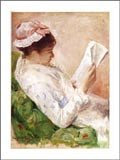 Chamber Music by Doris Grumbach
Chamber Music by Doris GrumbachMy rating: 5 of 5 stars
This rich novel is cast as the memoir of 90-year-old Caroline Maclaren, being written in the late 1970s at the request of her late husband's charitable foundation. Robert Maclaren was a a composer who was dubbed "America's Orpheus" for his use of American themes in his classical music. The marriage was rich in the world's admiration for his genius, but bereft of emotional depth between husband and wife. As his demands for the silent, solitary conditions he needed for composing became more extreme, Caroline's life became almost unbearably isolated and barren. Even her desire to accompany a singer on piano was thwarted by the increasingly-irascible Robert.
Early in the relationship, Caroline sensed that Robert had secrets that she could not define. There were hints of incest in his mother's behavior, and letters from a young man whose anguish and passion disturbed her. As time passed, his health and abilities deteriorated in a manner that others understood, even as she remained ignorant. She only learned the name of the illness after Anna, the nurse hired to help with his care, told her: syphilis.
Caroline spares nothing in her description of Robert's horrific decline, but says she only realized what it meant in the light of those old, passionate letters when Anna explained how the disease is transmitted. She found that she did not feel grief, as other widows do: " I felt none of that, for wife I was only in a sense, and woman I had not yet learned to be."
After Robert died, people from nearby Saratoga Springs helped to create the Maclaren Foundation, building six cabins on the wooded property to house a summer community for young composers. Anna remained and continued to plant flowers and vegetables according to science and ancient gardening lore.
It was Anna's comment about planting turnips and barley while naked that opened Caroline's lifelong repression of her need for love, physical and spiritual. She wooed Anna slowly, hardly understanding how two women can love.
Then, she writes, "I think of the first, soft spring rain; she was moisture to my dried roots... the way a certain configuration of notes played on the flute alone... can bring tears to one's eyes." They held hands and untangled the delicate roots of a wisteria vine. They were happy.
And yet, they never talked about their love: "a fitting vocabulary for such discussions did not exist." She knows now, as she writes, that women can walk together in daylight, but in her own time, "the world would not have sanctioned it, nor, for that matter, believed it of me." In fact, she writes, she is not entirely certain that such freedom is "...entirely salutary, whether the old must of chests, of closets, bell jars, and horsehair sofas is not a better climate for the storage of the private life."
Ah, but Doris Grumbach has no such hesitation. This delicate yet unflinching novel begins with the privileges of a talented man, and ends with the last thoughts of a woman who transcended the confines of her time. Books like this, and Ms. Grumbach's The Ladies , remind the modern readers that walks in the sunlight are the product of struggles and courage. Caroline Maclaren writes that the Foundation may delete parts of her story, but she will continue to write her extraordinary truth.
Thanks to NetGalley for the book. This is an honest review.
View all my reviews


No comments:
Post a Comment